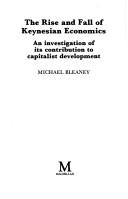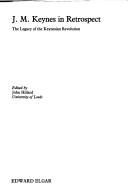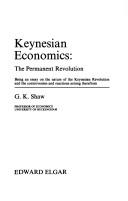
ISBN: 0333316665 0333316657 9780333316658 9780333316665 Year: 1985 Publisher: Basingstoke Macmillan
Abstract | Keywords | Export | Availability | Bookmark
 Loading...
Loading...Choose an application
- Reference Manager
- EndNote
- RefWorks (Direct export to RefWorks)
Macroeconomics --- Economic order --- Economic schools --- AA / International- internationaal --- 331.062 --- 331.01 --- 330.47 --- Anticyclisch beleid. Rational expectations. --- Evolutie van de economische cycli. --- Keynes en zijn school. --- Anticyclisch beleid. Rational expectations --- Evolutie van de economische cycli --- Keynes en zijn school

ISBN: 1852780126 9781852780128 Year: 1988 Publisher: Aldershot Edward Elgar
Abstract | Keywords | Export | Availability | Bookmark
 Loading...
Loading...Choose an application
- Reference Manager
- EndNote
- RefWorks (Direct export to RefWorks)
Keynes, John Maynard --- Keynesian economics --- Keynésianisme --- Keynes, John Maynard, --- Keynesian economics. --- AA / International- internationaal --- 330.47 --- Keynes en zijn school. --- Keynésianisme --- Keynes en zijn school --- Keynes, John Maynard, - 1883-1946

ISBN: 1852780622 1852786450 9781852786458 9781852780623 Year: 1988 Publisher: Aldershot Elgar
Abstract | Keywords | Export | Availability | Bookmark
 Loading...
Loading...Choose an application
- Reference Manager
- EndNote
- RefWorks (Direct export to RefWorks)
Keynes, John Maynard --- Keynesiaanse theorie --- Keynesian economics --- Keynésienne [Théorie ] --- Théorie keynésienne --- Keynes, John Maynard, --- AA / International- internationaal --- 330.47 --- Keynes en zijn school. --- 330.47Keynes en zijn school. --- Keynes en zijn school --- Keynes, John Maynard, - 1883-1946

ISBN: 1852780991 1852780983 9781852780982 9781852780999 Year: 1988 Publisher: Aldershot Edward Elgar
Abstract | Keywords | Export | Availability | Bookmark
 Loading...
Loading...Choose an application
- Reference Manager
- EndNote
- RefWorks (Direct export to RefWorks)
Macroeconomics --- Economic schools --- Keynesian economics --- Keynésianisme --- AA / International- internationaal --- 330.47 --- Keynes en zijn school. --- Keynesian economics. --- Keynésianisme --- Post-Keynesian economics --- Schools of economics --- Keynes en zijn school

ISBN: 1852781173 1852780533 1852780673 9781852780678 9781852780531 9781852781170 Year: 1988 Volume: 1 Publisher: Aldershot Edward Elgar
Abstract | Keywords | Export | Availability | Bookmark
 Loading...
Loading...Choose an application
- Reference Manager
- EndNote
- RefWorks (Direct export to RefWorks)
Macroeconomics --- Economic schools --- Keynesian economics. --- AA / International- internationaal --- 330.47 --- 330.01 --- Keynes en zijn school. --- Theorie van het economisch evenwicht. --- Keynesian economics --- Post-Keynesian economics --- Schools of economics --- Theorie van het economisch evenwicht --- Keynes en zijn school
Book
ISBN: 271781650X 9782717816501 Year: 1989 Publisher: Paris Economica
Abstract | Keywords | Export | Availability | Bookmark
 Loading...
Loading...Choose an application
- Reference Manager
- EndNote
- RefWorks (Direct export to RefWorks)
Macroeconomics --- Keynesian economics --- Keynes, John Maynard, --- AA / International- internationaal --- 330.00 --- 330.47 --- Economische en sociale theorieën: algemeenheden. --- Keynes en zijn school. --- Economische en sociale theorieën: algemeenheden --- Keynes en zijn school --- Keynes, John Maynard, - 1883-1946
Book
ISBN: 1852784008 9781852784003 Year: 1992 Publisher: Aldershot Edward Elgar
Abstract | Keywords | Export | Availability | Bookmark
 Loading...
Loading...Choose an application
- Reference Manager
- EndNote
- RefWorks (Direct export to RefWorks)
Keynes, John Maynard --- Keynesian economics --- Keynes, John Maynard, --- AA / International- internationaal --- 330.47 --- Keynes en zijn school. --- Post-Keynesian economics --- Schools of economics --- Keynes en zijn school --- Keynes, J. Maynard --- Keynes, J.M. --- Keynes, John Maynard, - 1883-1946
Book
ISBN: 2706105437 Year: 1993 Volume: 1 Publisher: Grenoble Presses Universitaires de Grenoble
Abstract | Keywords | Export | Availability | Bookmark
 Loading...
Loading...Choose an application
- Reference Manager
- EndNote
- RefWorks (Direct export to RefWorks)
Keynesiaanse theorie --- Keynesian economics --- Keynésienne [Théorie ] --- Théorie keynésienne --- Economics --- Economie politique --- History --- Histoire --- AA / International- internationaal --- 08 --- 330.47 --- Biografieën en memoires. --- Keynes en zijn school. --- Biografieën en memoires --- Keynes en zijn school

ISBN: 2804120716 9782804120719 Year: 1995 Volume: *16 Publisher: Bruxelles De Boeck
Abstract | Keywords | Export | Availability | Bookmark
 Loading...
Loading...Choose an application
- Reference Manager
- EndNote
- RefWorks (Direct export to RefWorks)
Economie --- Keynesian economics --- Keynésianisme --- Keynes, John Maynard, --- Keynesian economics. --- theories economiques --- AA / International- internationaal --- 330.47 --- Post-Keynesian economics --- Schools of economics --- economische theorieen --- Keynes en zijn school. --- Keynésianisme --- Keynes en zijn school
Book
ISBN: 9780674057753 Year: 2011 Publisher: Cambridge, MA ; London Harvard University Press
Abstract | Keywords | Export | Availability | Bookmark
 Loading...
Loading...Choose an application
- Reference Manager
- EndNote
- RefWorks (Direct export to RefWorks)
"The Great Recession of 2008 restored John Maynard Keynes to prominence. After decades when the Keynesian revolution seemed to have been forgotten, the great British theorist was suddenly everywhere. The New York Times asked, "What would Keynes have done?" The Financial Times wrote of "the undeniable shift to Keynes." Le Monde pronounced the economic collapse Keynes's "revenge." Two years later, following bank bailouts and Tea Party fundamentalism, Keynesian principles once again seemed misguided or irrelevant to a public focused on ballooning budget deficits. In this readable account, Backhouse and Bateman elaborate the misinformation and caricature that have led to Keynes's repeated resurrection and interment since his death in 1946. Keynes's engagement with social and moral philosophy and his membership in the Bloomsbury Group of artists and writers helped to shape his manner of theorizing. Though trained as a mathematician, he designed models based on how specific kinds of people (such as investors and consumers) actually behave -- an approach that runs counter to the idealized agents favored by economists at the end of the century. Keynes wanted to create a revolution in the way the world thought about economic problems, but he was more open-minded about capitalism than is commonly believed. He saw capitalism as essential to a society's well-being but also morally flawed, and he sought a corrective for its main defect: the failure to stabilize investment. Keynes's nuanced views, the authors suggest, offer an alternative to the polarized rhetoric often evoked by the word "capitalism" in today's political debates."--From the dust-jacket front flap.
Keynes, John Maynard, --- Keynesian economics --- AA / International- internationaal --- 330.47 --- Post-Keynesian economics --- Schools of economics --- Keynes en zijn school. --- Keynes en zijn school --- Keynes, John Maynard --- Keynes, J. Maynard --- Keynes, J.M. --- Economic schools

 Search
Search Feedback
Feedback About
About Help
Help News
News